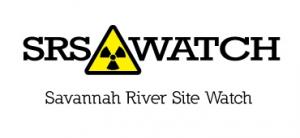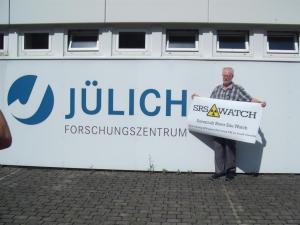U.S. DOE Plans to Export German Spent Nuclear Fuel to the Savannah River Site (SRS) for Processing have been Terminated
Unsuccessful Effort to Illegally Export Spent Fuel from Germany to SRS Ends in Environmental Victory, Positive Nuclear Nonproliferation Result
COLUMBIA, SC, US, January 10, 2023 /EINPresswire.com/ -- A decade-long effort to export a large volume of highly radioactive nuclear waste from Germany to the U.S. Department of Energy’s Savannah River Site (SRS) in South Carolina has been terminated, resulting in a significant environmental victory.
The German company managing the waste at the Juelich research site informed the public-interest group Savannah River Site Watch (SRS Watch) that “the option to ship the aforementioned spent fuel has indeed been terminated…” These definitive words bring an end to a decade-long effort by DOE to import an unusual form of highly radioactive spent fuel to SRS.
The termination of the export option means that there will be no sea transport of the large containers holding the waste to SRS, where it could have been processed, disposed of or stored, with no return to Germany. DOE has chosen to remain silent about the decision and, as it worked in favor of the waste import and waste dumping scheme.
The history of the project and the important decision by the German company managing the spent fuel - the Jülicher Entsorgungsgesellschaft für Nuklearanlagen mbH (JEN) - to halt consideration of export to SRS is documented in a new report released today by SRS Watch, entitled "Auf Wiedersehen to DOE Nuclear Waste Dumping Scheme." (The comprehensive 21-page report is posted on the SRS Watch website: https://srswatch.org/wp-content/uploads/2022/06/Auf-Wiedersehen-victory-on-German-spent-fuel-import-SRS-Watch-Jan-10-2023.pdf )
In the "Auf Wiedersehen" report, based on German and DOE documents, some obtained via the Freedom of Information Act (FOIA), visits to Germany and interaction in Germany with citizens’ groups, politicians and agency officials, SRS Watch presents a review of project that was flawed from the start and which failed as more information became public about it.
“The project to import and dump German spent fuel at SRS is now thankfully dead, due to diligence of activists and concerned officials in Germany in the face of DOE efforts to keep the scheme alive,” said Tom Clements, director of SRS Watch and author of the report. “The termination of this misguided project is not only an environmental victory but is also significant from a nuclear non-proliferation perspective as development of a new German-funded reprocessing technique to remove uranium from graphite fuel will likely have to be canceled,” added Clements.
Consultation began in 2012 between DOE and German entities to export spent fuel from a long closed experimental gas-cooled reactor - the Arbeitsgemeinschaft Versuchsreaktor (AVR) - with research into processing of the nuclear waste being done by the Savannah River National Laboratory (SRNL). The spent fuel, some of which contains U.S.-origin uranium, consists of about 290,000 uranium-impregnated irradiated graphite balls, stored in 152 robust casks stored at the Forschungszentrum Jülich (Jülich Research Center, or FZJ) located in the state of North Rhine-Westphalia (NRW) in western Germany. Clements of SRS Watch toured the waste storage facility in 2014.
DOE’s Office of Environmental Management (EM) originally claimed that the import was being considered for nuclear non-proliferation reasons but quickly changed their tune when SRS Watch obtained a memo prepared by DOE’s National Nuclear Security Administration (NNSA) which confirmed there was “not a proliferation concern” to leave the spent fuel in Germany. Striving to continue research funding from Germany and hoping to one day cash in on the high costs of shipping the casks to Charleston, SC and on to SRS by train, EM then flip flopped and asserted that the import was being considered for waste management reasons.
In 2017, the Savannah River Site Citizens Advisory Board (SRS CAB) took a position against the import of the waste to SRS but DOE rejected the recommendation and released an Environmental Assessment, prepared under the National Environmental Policy Act (NEPA), supporting consideration of the import. DOE’s “proposed action…to receive, store, process, and dispose” of the German spent fuel was embodied in a Finding of No Significant Impact (FONSI), which affirmed that there was no final decision on the import but work towards that was allowed to continue.
In the FONSI, DOE committed to providing the CAB and the public with updates about the project but has totally failed to honor that commitment. In its report, SRS Watch calls on DOE to immediately provide an update and to affirm that the import scheme has been terminated.
As the current storage building at Jülich is operating with an expired license, SRS Watch affirms in its report that a new storage building must be promptly built on site and that the spent fuel must not be transported to a temporary storage facility located in Ahaus.
“As we bid auf Widersehen to the misguided project to import and dump German spent fuel, we put DOE on notice that future efforts to import and dump foreign radioactive material at SRS or other DOE sites will be closely monitored,” added Clements of SRS Watch.
###
SRS Watch - a member of the Alliance for Nuclear Accountability (ANA), a network of public-interest groups located near DOE sites nationwide - continues to oppose the proposed SRS Plutonium Bomb Plant at SRS, to make the plutonium core of new nuclear weapons. We await a federal judge's ruling on the request by SRS Watch, Nuclear Watch New Mexico (Santa Fe, NM) and Tri-Valley CAREs (Livermore, CA) for preparation a Programmatic EIS (PEIS) on pit production. That PEIS must include an analysis of the dumping of transuranic waste (TRU) from pit production in DOE's Waste Isolation Pilot Plant (WIPP) near Carlsbad, New Mexico, as well as a deeper analysis of environmental impacts at SRS, Los Alamos National Lab (LANL) and Livermore National Lab (LLNL) as well as other DOE sites.
Tom Clements
Savannah River Site Watch
+1 803-834-3084
email us here
Visit us on social media:
Facebook
Twitter
Legal Disclaimer:
EIN Presswire provides this news content "as is" without warranty of any kind. We do not accept any responsibility or liability for the accuracy, content, images, videos, licenses, completeness, legality, or reliability of the information contained in this article. If you have any complaints or copyright issues related to this article, kindly contact the author above.



